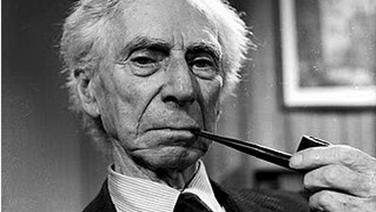The Spider’s Web versus Bertrand Russell’s materialist Philosophy (I)
One subject which operates at the core of human inquiry is the appropriation of meaning of our existence. Since the primordial period, humanity has always yearned to know the reason for the existence of the cosmos and the ultimate end of life. As it was before, so it is today. Nowadays, humanity seeks to know […]

Bertrand Russell
One subject which operates at the core of human inquiry is the appropriation of meaning of our existence. Since the primordial period, humanity has always yearned to know the reason for the existence of the cosmos and the ultimate end of life.
As it was before, so it is today.
Nowadays, humanity seeks to know the philosophy which undergirds the modern life we now live in? The discerning minds among us would like to appropriate the knowledge which nests beneath the home we live in, the food we eat, the cloth we wear and the road we travel on?
People of understanding in our milieu would like to know why it feels as if our days have become shorter, and why our aspirations are usually longer than our life span.
When carefully contemplated, the suggestion becomes tempting that the reason our life experiences disharmony inheres in the Russellian logic: the triumph of materialism over spiritualism.
Bertrand Russell, the British philosopher, mathematician and thinker once said that “Man is the product of causes which had no prevision of the end they were achieving; that his origin, his growth, his hopes and fears, his loves and his beliefs, are but the outcome of accidental collocations of atoms”.
Russell’s philosophy is materialist in tenor and scope. He is one of those philosophers who recognize the importance of knowledge in human existence. He knows the human nature is imbued with the potential to know; he holds the belief in the capacity of humankind to derive meaning from the universe without the prompting and intervention of the divine.
Russell, the materialist, always wanted to appropriate the meaning of life; he believed he could do that without seeking a recourse to the opinion of the owner of life!
But ironically we all share the materialist vision in varying degrees. Consider your dwelling, your apartment and you would appreciate the extent to which your life is either meaningful or meaningless.
Our homes nowadays look like prisons on the outside and are stuffed with what we can do without in the inside. We erect fences round our houses on the assumption that it could protect us; that it could deter the brigand from desecrating the sanctity of our dwelling.
But we often fail to realize that the higher the wall around the palace the more it attracts the enemy outside. In other words, walls are signifiers: they call attention to the existence of the treasured, the valued, the sacred. Once a particular space is forbidden, the urge to desecrate it is enarmoured.
The above reminds me of the story. Someone was said to have gone to Imam al-Ghazalli to enquire from him why was it that some Muslims in a particular town or village were in the habit of engaging in infractions.
Imam al-Ghazalli responded by saying that the questioner should grant that there were two houses in a particular neighbourhood. The first house was empty and lacking in treasures. The second was gated and walled simply because it was full of gold and silver.
Imam al-Ghazalli then asked the questioner- ‘which of the two houses would attract burglars and thieves more”.
The metaphor of the house pleaded by Imam Ghazalli is useful for sundry reasons. Literally, the logic in the story is axiomatic – the house that is full of treasures would attract attention. It is that house that would command interest and scrutiny.
Metaphorically, however, the house equally references the circumstance of the Muslim in his constant struggle to overcome the ministrations and temptations of the devil. It is the Muslim who has something to lose; it is the house of faith and piety that must be guided and watched over all of the time in order that it might not be polluted and desecrated by agents of the underground.
